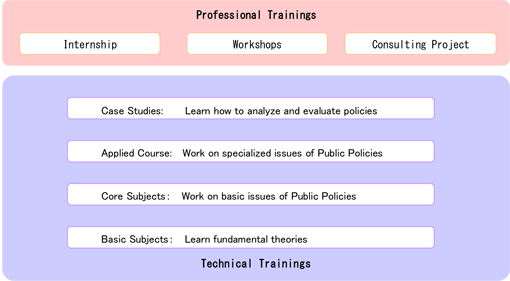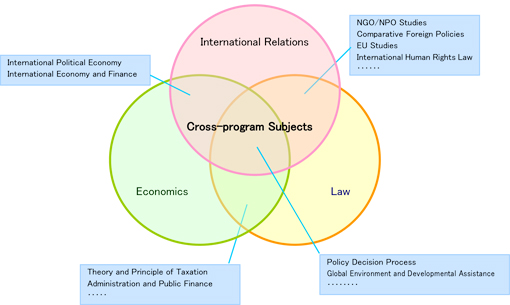



1. Basic Structure
The courses that are offered are classified into four categories, "basic subjects", "core subjects", "applied subjects", and "case studies". First, the "basic subjects" consist of compulsory courses that students must complete for policy analysis. Upon learning the ideas and theories in the basic subjects, students are then able to take the "core subjects" in order to study about the basic issues and problems concerning policies. Moreover, students will be able to learn about policy issues in depth and on a wider scale through the "applied courses". Lastly, students will be able to obtain the ability to analyze and evaluate policies through the theories and analytical methodology learnt from the other courses using real case studies from the "case studies" courses.
Figure 2: Basic Structure of IPP Curriculum

Furthermore, as a professional graduate school, the School of International and Public Policy offers professional training as well as technical training (academic training) through the lectures mentioned above. Such training is offered through workshops, as shown in Fig.2. These workshops offer students various skills necessary to play an active role in society, such as presentation techniques, techniques for facilitating stimulating discussion and deliberation, as well as writing abilities to summarize the themes that are given to them. In other words, the goal of professional training is to improve communication skills, that is, the ability to listen to others and present one's opinion.
2. Conditions for Registration
This section will explain the general outline concerning the necessary conditions for registration in order to obtain a professional Master's degree.
First the number of the credits required to obtain a professional Master's degree is 44 credits. "Credits" in general are calculated as "2 credits" for the "completion of a half-year course that takes place once a week".
In addition to this credit requirement, each program also requires the completion of the designated "compulsory courses" and "elective courses". "Compulsory courses" are courses that everyone must complete in order to graduate. "Elective courses" refer to courses that students can choose from to fulfill the designated amount of credits. Students can choose the electives of their choice according to their research interests.
As a general principle, the School of International and Public Policy does not require students to write a Master's thesis. However, they are required to write a research paper or policy report as a part of the professional training for each program. This is because graduates of the School of International and Public Policy are expected to write a quality report directly related to policies, as well as to have abilities to apply what they have learned through technical training to real life policy issues.
3. Characteristics of the Curriculum
The School of International and Public Policy provides a multi-dimensional approach to various policy issues. While students are required to select a major or program they wish to study in order to specialize in a particular field, they are also recommended to study and become familiar with various other approaches. As part of the curriculum, we offer courses called "cross-program subjects" taught jointly by faculty members from different academic fields, where students and faculty members are given the opportunity to discuss policies from various perspectives.
Figure 3 shows the conceptual model of the curriculum of the School of International and Public Policy. As indicated in this figure, "cross-program subjects" are offered where the 3 academic fields of law, international relations and economics overlap.
Figure 3:Integrated Discipline and Cross-program Subjects


